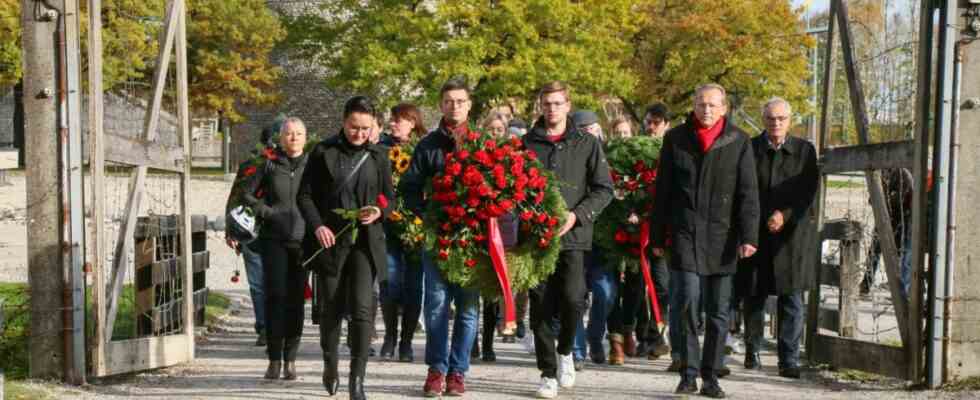Shortly after 1 p.m. on this sunny Sunday afternoon, the approximately 180 people present at the Dachau concentration camp memorial site set out. The gravel crunches under their feet. Together and side by side, they walk across the former roll call area along the camp road, where the prisoner barracks once stood. They carry wreaths and roses, which they place at the memorial to the unknown inmate at the crematorium to commemorate the victims of National Socialism, as they did in the many years before.
The Reichspogromnacht from November 9th to 10th, 1938, when the Nazis began to systematically exterminate Jews in Germany and Europe and imprisoned 11,000 Jewish men in the Dachau concentration camp, is celebrating its 84th anniversary this year. Since 1952, i.e. for seven decades, the youth of the German Trade Union Confederation (DGB) has been organizing commemorative events in the former Dachau concentration camp on the occasion of this “Night of Shame”. Bernhard Stiedl, chairman of the Bavarian DGB, said in his welcome speech in front of the international memorial that the commemorative events of the Bavarian DGB youth were the “longest commemoration project by an organization that was not persecuted in Germany”. In view of the resurgence of right-wing extremist parties in Germany and throughout Europe, this remembrance work is more important than ever. “We must not let up in resolutely opposing neo-Nazis, racists and anti-Semites of all shades.”
“To remember is to fight”
For union youth, remembrance work is inseparable from a moral and political commitment to active democratic intervention in today’s world. Accordingly, the motto of the commemorations in Dachau has always been: “Remembering means fighting”.
Tahera Ameer, who is giving the commemorative speech in Dachau this year, also refers to this appeal. Ameer is a board member of the Amadeu Antonio Foundation, which has been committed to a democratic civil society since it was founded in 1998 and has consistently opposed right-wing extremism, racism and anti-Semitism. This afternoon, Ameer is standing in front of the so-called incineration room of the former Dachau concentration camp, where the Nazis cremated three people at the same time in each of the four ovens, and is speaking to those present, who have gathered in a semicircle in front of her, including the state parliament member Katharina Schulze ( Greens) and Florian Ritter (SPD) or memorial director Gabriele Hammermann.
“Remembering is not putting down flowers and then feeling meaningful”
It’s a remarkable speech. Ameer is angry. She criticizes the culture of remembrance in Germany, especially the ritualized commemoration of anniversaries and the self-satisfaction of post-National Socialist society with its confrontation with the past. The motto “Remembering is fighting” means a lot to her, says Ameer. Remembering is an effort. “Remembrance is not laying down flowers and then feeling meaningful, only to have a good glass of wine afterwards. Remembering the Shoah has always been a struggle for recognition, another struggle for survival for the survivors. It is brutal and always has been. And it still is.”
Tahera Ameer, board member of the Amadeu Antonio Foundation, during her memorial speech at the Dachau concentration camp memorial site.
(Photo: Niels P. Jørgensen)
Ameer also cites the policies of Finance Minister Christian Lindner (FDP) as an example of how brutal the fight for recognition can be. As the time recently reported, Lindner is said to have tried to save on payments to Holocaust survivors. In 1952, the Federal Republic of Germany first committed itself to paying so-called compensation payments for the Holocaust, which have been paid annually ever since. But in order to be able to comply with the debt brake in 2023, according to the research, Lindner is said to have tried this year to keep the costs of the German debt as low as possible and had talks with the Jewish Claims Conference as if these were collective bargaining. “Debt brake” was the headline in Die Zeit. The conflict only eased after US Secretary of State Anthony Blinken intervened, urging Germany to “fulfill its obligations”.
Ameer speaks of an “intolerable, and so self-confident and self-assured attitude of the finance minister”. It is not only this example that makes it clear “that there is still a fight to gain insight into the crimes here in Germany”. In other places and in many discussions on the culture of remembrance and commemoration, too, it seems “as if the Shoah were a Jewish story”. But it is a German story. “Remembering means fighting – also fighting against the ignorance and indifference of the perpetrator society,” says Ameer. She concludes her speech by saying, “Let’s be angry about this and let’s take this as a call to action.”
After Ameer, Eva Wohlfahrt, Chairwoman of the DGB Youth Bavaria, steps up to the lectern. She thanks her for this “strong and combative speech” and then calls on those present to observe a minute’s silence. Silence fell over the crematorium area of the former Dachau concentration camp. It’s all said.

